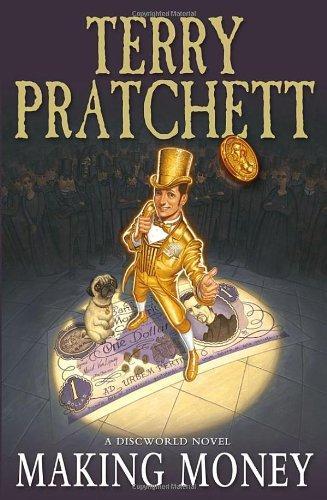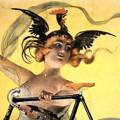Post Tenebras Lire reviewed Monnayé by Terry Pratchett
Une jubilatoire leçon de finance à la "Disque-Monde"
4 stars
Pour profiter au mieux de ce tome, il faut avoir lu Timbré.
Pourquoi ? On retrouve Mr Lipwig qui a ressuscité la poste dans le tome 33.
Le voilà vice-président de la banque d'Ankh-Morpork grâce à une discrete manigance du patricien d'Ankh-Morpork : Vétérini.
Préparez-vous pour une bonne leçon d'économie morpokienne...
Avec un président de la banque centrale qui est un chien,
un vice-président, Mr Lipwig, qui a plutôt l'habitude de "sortir" l'argent des banques.
une famille fortunée qui veut remettre la main sur "sa" banque.
C’était effectivement ce qu’on appelait une « vieille fortune », donc une fortune acquise si loin dans le passé que les forfaits qui avaient au départ rempli les coffres étaient désormais historiquement hors sujet
un comptable très maniaque
et toute une galerie de personnages pittoresques.
Vous vous souvenez de ces vidéos avec l'argent qui coule d'un récipient …
Pour profiter au mieux de ce tome, il faut avoir lu Timbré.
Pourquoi ? On retrouve Mr Lipwig qui a ressuscité la poste dans le tome 33.
Le voilà vice-président de la banque d'Ankh-Morpork grâce à une discrete manigance du patricien d'Ankh-Morpork : Vétérini.
Préparez-vous pour une bonne leçon d'économie morpokienne...
Avec un président de la banque centrale qui est un chien,
un vice-président, Mr Lipwig, qui a plutôt l'habitude de "sortir" l'argent des banques.
une famille fortunée qui veut remettre la main sur "sa" banque.
C’était effectivement ce qu’on appelait une « vieille fortune », donc une fortune acquise si loin dans le passé que les forfaits qui avaient au départ rempli les coffres étaient désormais historiquement hors sujet
un comptable très maniaque
et toute une galerie de personnages pittoresques.
Vous vous souvenez de ces vidéos avec l'argent qui coule d'un récipient à l'autre pour expliquer les transferts économiques ?
Dans le sous-sol de la banque, il y a une sorte d'alambic démentiel qui fuit de partout.
Mais dans le disque-monde si vous fermez une vanne de cet alambic, une partie de l'économie d'Ankh-Morpok s'assèche !
Mr Lipwig va utiliser toute sa persuasion pour convaincre Ankh-Morpok que l'ont peu avoir de l'"argent" sans avoir besoin d'une tonne d'or de "garantie" dans une salle forte.
Il va faire oublier l'étalon-or pour une autre garantie très disque-monde.
Comme d'habitude, c'est toujours finement observé ! Quelques citations ...
— Pas de pauvres, alors ?
— Pas dans les banques, monsieur Lipwig. Personne en dessous de cent cinquante piastres de revenus par an. C’est pour cette raison qu’on a inventé les chaussettes et les matelas. Mon défunt mari disait toujours que le seul moyen de gagner de l’argent sur les pauvres, c’est de les maintenir pauvres— Monsieur le directeur, je proteste ! La banque n’est pas un jeu !
— Cher monsieur Fripon, c’est un jeu, et un jeu ancien qui s’appelle “Jusqu’où on peut aller ?”Quand on vendait des rêves à suffisamment de monde, nul n’osait se réveiller.



